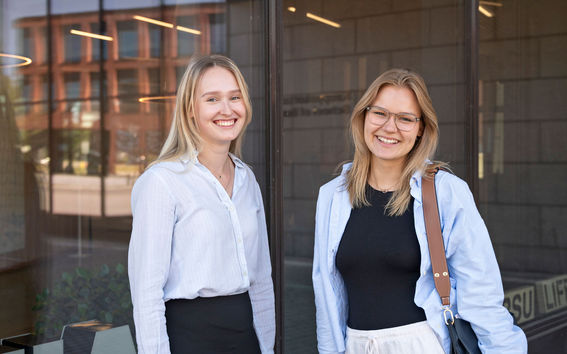Online AI course could boost study equality

Artificial Intelligence stormed into everyone's reach late in the year 2022, when Chat GPT was launched. In the summer of 2023, Aalto University published guidelines for teachers and students on the use of AI in teaching and learning. According to students, however, AI is still very variably used in teaching.
‘At the moment, proficiency in AI largely depends on the student's personal interest’, says student of the Bachelor's Programme in Business and a member of the student organisation KY's board, Liina Röyskö.
‘The use of AI is not consistently taught, and by graduation, there might be a great disparity in students' AI abilities, as not everyone is keen on making a considerable effort to learn to use that technology.’
Röyskö and another member of KY's board, Kerttu Lammi, who studies in the English Bachelor's Programme in Economics, raised the discussion about AI during the School of Business's internal seminar in early summer. They wish that there could be an open conversation about AI so that it wouldn't feel too challenging and unpleasant for teachers, and the dialogue would benefit both students and teachers.
‘We understand that AI is a new and rapidly developing subject, and teachers prioritise teaching their own subjects. Still, we hope that the School of Business would consider how they could also further strengthen their position as Finland's leading business school by teaching intelligent use of AI’, says Kerttu Lammi.
‘Employers, in any case, expect recent graduates to be able to utilise AI at work, and many employers even consider AI skills more important than specific industry knowledge.’
Liina Röyskö recounts that current and future students appreciate Aalto University because it provides excellent skills for job hunting.
‘Artificial Intelligence is here to stay, and students will be using it anyway. Proficient, efficient use of it would help us stand out more in the job hunt’, she says.
Desired: An online course on AI
To improve the situation, Röyskö and Lammi suggest an online course available to all Aalto University students – a kind of "AI driver's license". It would familiarise students with the most common AI tools and how to use them efficiently, for instance, in coursework or exam preparation. A shared online course would level the playing field and increase equality in studying, with everyone learning the key knowledge about AI, its benefits and efficient, ethically sustainable use.
‘An online course could be completed at the time most suitable to the student. It would be a much better option compared to the AI lecture presently held for new students at the beginning of their studies because one could delve deeper into this important topic. Also, at the beginning of studies, there is so much new to learn that it's challenging to absorb all necessary information from one AI lecture’, Liina Röyskö clarifies.
Cultivating trial and error, and patience in AI use
Pedagogical expert at Aalto University, Maura Ratia, and expert in digital pedagogy Silvana Perez Läherinta understand the students' concerns. On the other hand, they are also aware of the teachers' difficult role as the landscape is rapidly evolving.
‘Learning new things takes time and requires patience. Some teachers are already accustomed to using AI, and others are novices. However, we all still have a lot to learn about using AI intelligently so that it supports learning and work effectively. AI technology is advancing at a rapid pace, and several projects and pilots aim to increase the applicability of AI in teaching’, Silvana Perez Läherinta says.
‘A lot of aspects relating to financing, security and renewing education presently slow down the use of AI in teaching, but the students' wish for a separate AI-online course has been heard. It's an excellent proposal that we will certainly try to implement somehow’, continues Perez Läherinta.
Maura Ratia urges students to boldly express their wishes to teachers, but also to be patient. There are many factors in the background, for instance, those related to data security, which might not be readily apparent to the student.
‘Students should boldly ask teachers if instructions for using AI remain unclear. And, if for some reason asking the teacher feels difficult, one can also inquire about the subject from Learning Services’, Ratia advises.
Ratia and Perez Läherinta recommend that the teachers turn to them when they need support in developing teaching. The hope is for a permissive atmosphere, where teachers can critically and curiously use AI, try, fail, have open conversations with colleagues and students about the subject and thus further their teaching skills in utilising AI.
Sparking inner motivation is crucial
But what will the students of today and future learn if they use AI to help them in completing coursework and preparing for exams? Will they still understand the big picture and cause-effect relationships of matters?
Students acknowledge that AI can be lazily used, where it doesn't enhance personal studying. However, in their opinion, when students wish to do so, they can find other lazy study methods that do not support comprehensively understanding and learning matters.
‘In any case, everyone is responsible for their own learning, and the 'lazy use' of AI decreases when the student knows how to utilise it correctly. The misuse of AI often stems from the fact that the student does not have enough knowledge’, states Kerttu Lammi.
Likewise, Maura Ratia stresses the student's responsibility for their learning.
‘Sparking inner motivation towards the subject being studied is most important because then the focus is on learning and not effortlessly completing the course, for example, with the help of AI.’
Further information from the Associate Dean of teaching and education, Professor Tomas Falk, starting from August 6, 2024.
Read more news
Online Writing retreats for doctoral students in Finnish in spring 2026
Join the monthly communal meetings for research reporting.
Loan laptops available for students from IT Services for short-term use
Teachers can order laptops for students if needed.
Isabel Salmi emphasises that you don't have to be a math genius to study Information Technology
Third-year Information Technology student Isabel Salmi got help with developing a study technique – and found the joy of mathematics in the process






